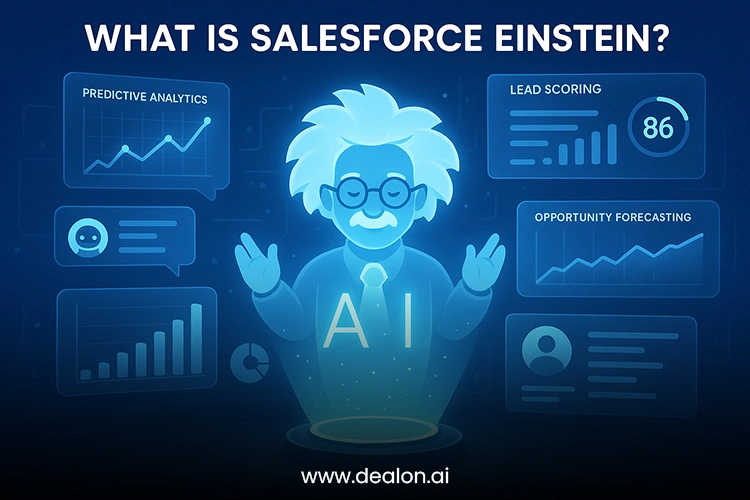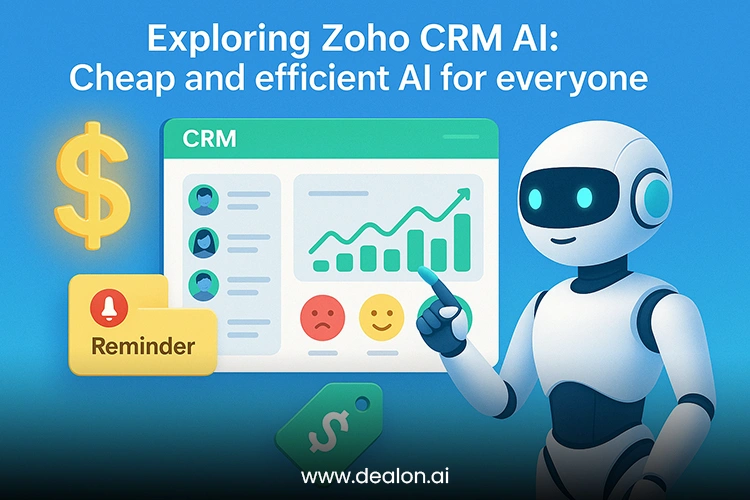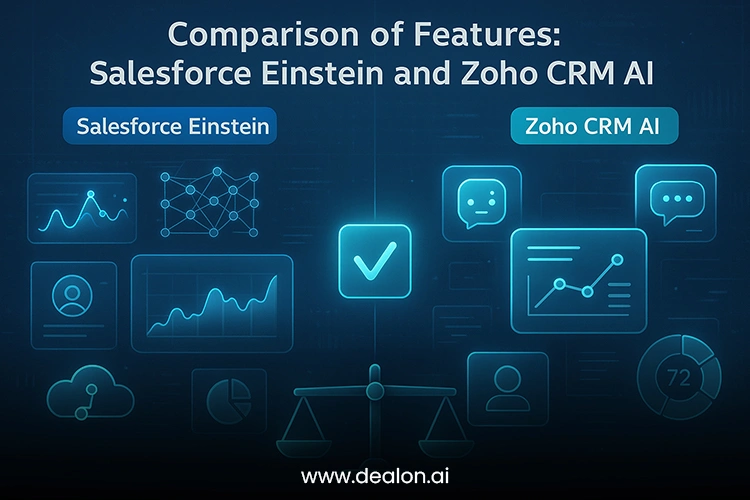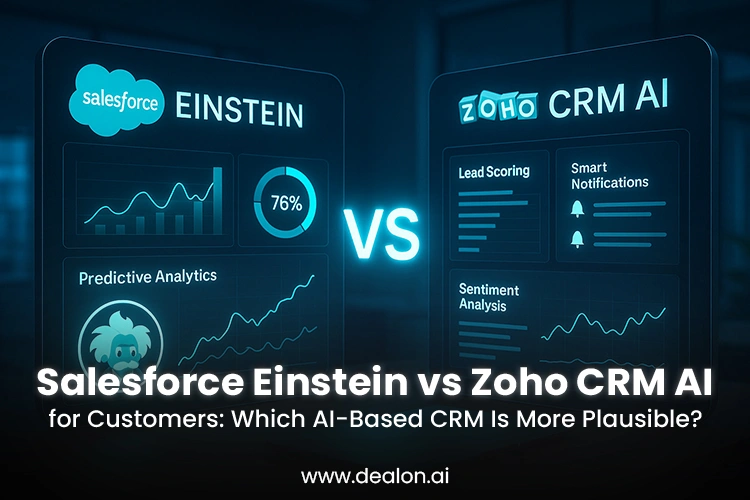The dynamic customer relationship management (CRM) world disrupts businesses more as companies make use of AI-based tools to streamline workflows, improve customer experiences, and make more intelligent (data-driven) decisions. Salesforce Einstein and Zoho CRM AI are two other industry giants that have found themselves in the lead in terms of such a market, providing the most advanced tools of artificial intelligence aimed at a more efficient CRM.
However, in the case of selecting the right AI-powered CRM, the matter is not always obvious. Although the two mentioned platforms are expected to streamline the business cycles, augment customer intelligence, and mechanize the monotonous activities, they support varying business requirements, budgets, and technical environments. Salesforce Einstein is also a notable product that is well embedded in the Salesforce platform and has access to advanced and customizable functionality as well as robust reporting.
Conversely, Zoho CRM AI, otherwise referred to as Zia, is a cheap option that offers excellent AI features, ease of use, and compatibility with a broad range of third-party applications. In this blog post, we are going to compare the two AI-enabled CRM systems in terms of features, performance, and overall merits to enable you to decide which one is more suitable for your business goals.
You might be a small startup or a large enterprise, but it is essential to learn the intricacies of these platforms to make a choice that makes sense for the long-term vision of your CRM strategy. Let us roll into the comprehensive comparison of Salesforce Einstein vs. Zoho CRM AI and build on the insights that aid in finding out which artificial intelligence-empowered CRM is the best in the business.
Also Read: 7 Tools to Supercharge Your Lead Generation with AI
Expertise I: What is Salesforce Einstein?

Salesforce Einstein is one of the leaders in terms of AI-based CRM tools and provides unprecedented levels of intelligence as it is fully integrated with Salesforce’s massive collection of tools. Designed to support the complex requirements of large businesses, Einstein offers complete functionality across all corners. The main advantage of it is that it provides high levels of customization, which means that it can help businesses to specifically customize the AI operation, achieving considerably improved efficiency of their operations and customer interaction in this way.
Using Salesforce Einstein, companies can automate essential processes like lead scoring, opportunity forecasting, and sentiment analysis, which allow predicting the behavior of customers easily and with quite a high accuracy. Einstein can analyze the past data and real-time interaction to identify the probability of a lead becoming a paying customer, enabling sales teams to prioritise their work effectively. Additionally, it incorporates AI technologies, such as intelligent chatbots, that can send real-time responses to customer requests, thereby enhancing service and work processes. The predictive analytics capability in Einstein enables businesses to forecast customer requirements and take fact-based decisions to improve sales performance and customer satisfaction.
The fact that Salesforce Einstein integrates with the rest of the Salesforce ecosystem is one of the most remarkable features of this platform. In the case of companies already using Salesforce tools: Marketing Cloud, Service Cloud, and Commerce Cloud, Einstein acts as a logical extension to these current platforms that creates enhanced value for the existing solutions.
Its seamless integration across multiple platforms means that customer data is not only captured but is also used in all the contact points to enable a 360-degree perspective of the customer journey. The degree of such integration designates Salesforce Einstein as an excellent fit for those enterprises that need complicated solutions that can adapt to the needs of the companies, as well as work with extensive data and multifaceted processes.
Exploring Zoho CRM AI: Cheap and efficient AI for everyone

By contrast, Zia, also known as Zoho CRM AI, is a tempting, affordable option since it has potent AI functions without being as inaccessible as the one described by Zoho. Zia has a simple way to try daily organization with a focus on lead management, automation of tasks, and streamlining the workflow, which makes it a perfect fit to work with a medium or small organization.
The strategy utilized in Zoho AI is user-oriented. It aims at providing a user-friendly interface, easy to browse and learn, so that new users have a minimal learning curve. The simplicity, combined with its advanced AI capabilities, makes Zia a beautiful decision for businesses looking to achieve efficiency at a low cost compared to enterprise-level CRMs.
Several of Zia’s major features are predictive sales analytics, sentiment analysis, and smart notifications. Also assisting in making better decisions is the predictive sales analytics feature that allows businesses to make forecasts about upcoming sales trends and sentiment analysis, which enables better awareness about customer feedback. AI-powered smart notifications notify about significant events like follow-ups, customer interactions, or other to-be-done tasks at a glance and make sure no critical activities go unnoticed. These attributes enable businesses to act before the need arises for customer satisfaction and deliver increased performance.
Versatility is one of the main strengths of Zia. Zoho CRM AI integrates well with a large number of third-party applications, which enables businesses to configure the CRM system to suit their defined needs. As far as integrating with marketing platforms, social media tools, customer service systems, etc.
Zoho integration has made sure that the data is freely flowing throughout several touchpoints, giving businesses an integrated look at their interaction with customers. This flexibility can especially come in handy to the company that is already dependent on numerous software tools and requires the AI CRM solution that can be unobtrusively integrated with their current technological environment.
The affordability of Zia makes it helpful to businesses that have to work on a budget. Both price levels are designed to support organizations of any size so that small- to mid-sized organizations do not have to lose their financial opportunities to use powerful AI tools. Also, the user-friendly design of Zoho CRM AI helps businesses to swiftly onboard employees and utilize AI functionalities immediately, since workforces with different technical skills can operate it.
Comparison of Features: Salesforce Einstein and Zoho CRM AI

In the case of AI-powered CRMs, the major challenge involved in identifying the best option is finding out the strengths and setbacks of each tool. Both Salesforce Einstein and Zoho CRM AI have powerful AI features, but they serve different business requirements. To see which platform is better in definite aspects, we are going to divide the main features they offer and compare the advantages of each of them.
Another feature of Salesforce Einstein, with one of the greatest potentials, is dedicated machine learning. The algorithms allow for exact lead scoring models that determine the propensity of conversion given the past customer data. Through the study of behavior patterns, prior interactions, or any other data point, Salesforce Einstein can award lead scores that emphasize the most likely sales. As such, sales teams can concentrate on the most significant chance of making a sale. Also, Salesforce Einstein opportunity forecasting applies predictive analytics to forecast sales opportunities and give enterprises an understanding of which deals are likely to be closed and when.
Zoho CRM AI does provide predictive analytics in the form of lead scoring and opportunity forecasting; however, its models are generally lower-end than Salesforce Einstein. The algorithms used by Zoho perform well in monitoring the lead behavior and engagement; however, they might lack the same degree of precision and depth in determining future opportunities. Salesforce can engage in a further breakdown of the customer behavior data through deep learning, which results in more meaningful and true-to-life predictions.
One of the main reputations of Salesforce Einstein is its level of data detail correlation and reporting. Analytics tools within the platform present detailed insights into the behavior of its customers, the current trend in sales, and the work of the team. One of the strengths is the capability of Einstein to process large volumes of data and convert it into intelligence in use. As an example, it does not just measure sales performance but also indicates patterns that may assist businesses in comprehending customer preferences, and it becomes easier to divide the audiences and target them more precisely.
Both Salesforce Einstein and Zoho CRM AI are also sources of valuable data insights. Still, Salesforce Einstein analytics tools are even more powerful and more sophisticated than Zoho CRM AI ones. The essential predictive features that Salesforce Einstein offers are lacking compared to the reports and dashboards provided by Zoho CRM AI, which are helpful to its customers to understand sales and customer behaviors fully.
The two sites are great in automating the routine CRM activities, i.e., data entry, follow-up emails, and reporting. The ability to customize the workflow automation in Zoho CRM AI is often celebrated as businesses can now customize automated processes in accordance with their requirements. The system is easy to navigate with a user-friendly interface, which makes establishing the workflow reasonably easy even for businesses that lack their own IT team. It is highly flexible and easily modified, as it is desirable in companies that require a quick and efficient formation.
Zoho CRM AI is well-known because of its convenient and plain user interface. It has a neat interface and an intuitive structure, enabling teams to be brought up to operate it in no time without deep training. The user-friendly interface of Zoho can be a competitive advantage, as there may be small and mid-sized businesses that need to implement their system quickly and without disruption.
Pricing: Which is the AI-Powered CRM that is more valuable?
One of the most important issues when selecting between Salesforce Einstein and Zoho CRM AI is pricing. Salesforce is a component included within the Salesforce ecosystem and has a high price attached to it. Severe customization capabilities and the exhaustive features that come with Einstein make it a preferred mix fit within huge organizations with huge budgets. The investment will be helpful in businesses with complicated workflows, extensive reporting needs, and client-specific requirements. The price may, however, be too expensive considering other small companies or startups desiring a cheaper option.
Zoho CRM AI instead has a significantly lower price. The easy-to-use pricing plans that Zoho CRM AI provides make it affordable even to small to medium-sized companies, as they do not have to spend a fortune to obtain AI-enhanced CRM services. Businesses that do not need all the capabilities of all of the Salesforce Einstein advanced functionalities can find another viable alternative in Zoho CRM AI, which also offers most of the same core AI functions. The amount of money that Zoho can offer is one of the reasons why it is a popular decision among organizations with limited budgets, even those that prefer ease of use, cheap, and efficient services.
Integration Capabilities: Which CRM Integrates Best?
When a CRM platform is chosen, capabilities integration is the key element to consider. Being able to integrate your CRM tool with the rest of your technology stack is critical in making sure that business processes are not hampered and data smoothly passes through platforms. Salesforce Einstein and Zoho CRM AI are available in multiple integration options, but they serve various needs and corporate realities.
But where companies are not only relying on Salesforce products, the picture is more complicated. The ecosystem is tailored towards Salesforce tools, although some aspects of Salesforce Einstein come with third-party support. This may be a constraint on a company whose software needs are more varied, or the company is dependent on a variety of applications not in the Salesforce environment. In these types of businesses, creating third-party integrations might need extra configuration or even third-party middleware solutions, and therefore, the cost of implementation may be higher.
Zoho CRM AI, on the other hand, has highly developed integration features that can be used with an extensive and varied range of third-party applications. Its flexible API design and ready-made integrations allow Zoho CRM AI to fit well with tools of various categories, including marketing automation tools and accounting systems, communication and analytics platforms, and more.
Zoho offers a very flexible integration strategy where a business can coordinate its CRM with an extensive technology stack, regardless of the applications you implement. This helps particularly in cases of small to mid-sized establishments that might already be employing a wide assortment of tools and require a CRM program that can be integrated with their current systems without a lot of problems.
Help and Resources: Community and Support
In the process of selecting an artificial intelligence-enabled CRM, a well-developed support service and active user community are required to ensure the business will be able to unlock the potential of the system. Both Zoho CRM AI and Salesforce Einstein provide extensive support documentation, with one approach having a vast distinction in dealing with their clients.
Being enterprise-oriented, Salesforce Einstein offers an enhanced support level to the users. The platform has 24/7 customer service with customer account managers and success teams that go to businesses to make sure they are maximizing their investment. Moreover, Salesforce has an ample amount of training materials, such as tutorials, webinars, and an extensive knowledge base.
Such resources are significant in terms of large organizations that have specialized teams to utilize the depth of Salesforce Einstein fully. Nonetheless, due to the complexity and the high degree of customization that Salesforce Einstein offers, organizations might require special skills and experience to take the platform to where it is supposed to be. Smaller businesses might feel that the requirement to obtain professional help is excessive and expensive because somebody might be needed to provide some part of these features or integrations.
What is the Best CRM to use with AI?
At the end of the day, the preference of Salesforce Einstein over Zoho CRM AI is due to several variables, such as company size, budget, and technical requirements. Both platforms can be described as powerful in terms of AI possibilities; however, they address the needs of different individuals and have various advantages.
CRM Salesforce Einstein is the perfect choice when its complexity can support the large-scale business and when it must have a high level of customization. Its excellent built-in functions into Salesforce, rich AI capabilities, and myriad reporting options make it a fantastic choice for businesses with complicated processes, large data requirements, and the capacity to address a more detailed environment. In case you are already using Salesforce tools or in need of advanced predictive analytics, profound data insights, and customization, Salesforce Einstein has no contest. The implementation may, however, be prohibitive for smaller businesses.
Conclusion
The AI capabilities that both Salesforce Einstein and Zoho CRM AI provide are powerful, but the truth is that one of the solutions is stronger than the other, and the one to be chosen should depend on the needs of your business and affordability. Salesforce Einstein is best suited to large companies with the need for heavy customization, advanced AI, and fits well in the Salesforce system.
Its end-to-end analytics and prediction mechanism are suitable for a complicated workflow. Conversely, Zoho CRM AI is a cost-effective, easy-to-use option that has a high degree of integration flexibility and is therefore an excellent option for small to mid-sized companies. Conclusively, the two CRMs present functional capabilities, and the most suitable will be the one to keep in line with the size of your company, its technical needs, and its growth needs.

